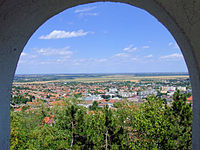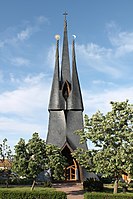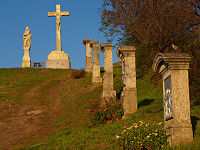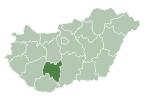Tolna County
Tolna County Tolna vármegye | |
|---|---|
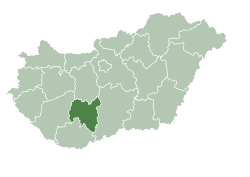 Tolna County within Hungary | |
| Coordinates: 46°30′N 18°35′E / 46.500°N 18.583°E | |
| Country | Hungary |
| Region | Southern Transdanubia |
| County seat | Szekszárd |
| Districts | |
| Government | |
| • President of the General Assembly | Tamás Fehérvári (Fidesz-KDNP) |
| Area | |
• Total | 3,703.16 km2 (1,429.80 sq mi) |
| • Rank | 15th in Hungary |
| Population (2018) | |
• Total | 219,317[1] |
| • Rank | 18th in Hungary |
| GDP | |
| • Total | HUF 592 billion €1.900 billion (2016) |
| Postal code | 702x – 7252, 7352 – 7361 |
| Area code(s) | (+36) 74, 75 |
| ISO 3166 code | HU-TO |
| Website | www |
Tolna (Hungarian: Tolna vármegye, pronounced [ˈtolnɒ]; German: Komitat Tolnau) is an administrative county (comitatus or vármegye) in present-day Hungary as it was in the former Kingdom of Hungary. It lies in central Hungary, on the west bank of the river Danube. It shares borders with the Hungarian counties of Somogy, Fejér, Bács-Kiskun, and Baranya. The capital of Tolna county is Szekszárd. Its area is 3,703 km2.
History
Tolna (in Latin: comitatus Tolnensis) was also the name of a historic administrative county (comitatus) of the Kingdom of Hungary. Its territory, which was about the same as that of the present Tolna county, is now in central Hungary. The capital of the county was Szekszárd.
Demographics
Religion in Tolna County (2022 census – of those eho declared their religion (62.2%))
In 2015, Tolna had a population of 225,936 and the population density was 61 inhabitants per square kilometre (160/sq mi).
| Year | County population[3] | Change |
|---|---|---|
| 1949 | 275,644 | n/a |
| 1960 | -1.29% | |
| 1970 | -4.90% | |
| 1980 | 2.90% | |
| 1990 | -4.73% | |
| 2001 | -1.57% | |
| 2011 | -7.74% | |
| 2015 | -1.95% | |
| 2018 | -3.01% |
Ethnicity
Besides the Hungarian majority, the main minorities are the Germans (approx. 10,000) and Roma (8,500).
Total population (2011 census): 230,361
Ethnic groups (2011 census):[4]
Identified themselves: 214,953 persons:
- Hungarians: 194,685 (90,57%)
- Germans: 10,195 (4,74%)
- Roma: 8,768 (4,08%)
- Others and indefinable: 1 305 (0,61%)
Approx. 32,000 persons in Tolna County did not declare their ethnic group at the 2011 census.
Religion
Religious adherence in the county according to 2011 census:[5]
- Catholic – 108,755 (Roman Catholic – 108,392; Greek Catholic – 331)
- Reformed – 18,533;
- Evangelical – 6,800;
- Other religions – 2,734;
- Non-religious – 35,803;
- Atheism – 2,194;
- Undeclared – 55,542.
Regional structure

| No. | English and Hungarian names |
Area (km2) |
Population (2011) |
Density (pop./km2) |
Seat | No. of municipalities |
| 1 | Bonyhád District Bonyhádi járás |
476.77 | 31,567 | 66 | Bonyhád | 25 |
| 2 | Dombóvár District Dombóvári járás |
509.02 | 32,331 | 64 | Dombóvár | 16 |
| 3 | Paks District Paksi járás |
836.00 | 49,433 | 59 | Paks | 15 |
| 4 | Szekszárd District Szekszárdi járás |
656.18 | 60,122 | 92 | Szekszárd | 17 |
| 5 | Tamási District Tamási járás |
1,019.94 | 38,705 | 38 | Tamási | 32 |
| 6 | Tolna District Tolnai járás |
205.24 | 18,203 | 89 | Tolna (town) | 4 |
| Tolna County | 3,703.16 | 231,183 | 64 | Szekszárd | 109 | |
|---|---|---|---|---|---|---|
Politics
The Tolna County Council, elected at the 2024 local government elections,[6] is made up of 15 counselors, with the following party composition:[7]
| Party | Seats | Current County Assembly | ||||||||
|---|---|---|---|---|---|---|---|---|---|---|
| Fidesz-KDNP | 11 | |||||||||
| Our Homeland Movement | 2 | |||||||||
| Democratic Coalition | 1 | |||||||||
| Momentum Movement | 1 | |||||||||
Presidents of the General Assembly
| List of presidents since 1990[8] | |
|---|---|
| Tamás Fehérvári (Fidesz-KDNP) | 2014– |
Municipalities
Tolna County has 1 urban county, 10 towns, 5 large villages and 93 villages.
- City with county rights
(ordered by population, as of 2011 census)
 Szekszárd (34,296) – county seat
Szekszárd (34,296) – county seat
- Towns
 Paks (19,369)
Paks (19,369) Dombóvár (19,010)
Dombóvár (19,010) Bonyhád (13,630)
Bonyhád (13,630) Tolna (11,126)
Tolna (11,126) Dunaföldvár (8,775)
Dunaföldvár (8,775) Tamási (8,349)
Tamási (8,349) Bátaszék (6,370)
Bátaszék (6,370) Simontornya (4,057)
Simontornya (4,057) Nagymányok (2,338)
Nagymányok (2,338) Gyönk (2,052)
Gyönk (2,052)
- Villages
- Alsónána
- Alsónyék
- Aparhant
- Attala
- Báta
- Bátaapáti
- Belecska
- Bikács
- Bogyiszló
- Bonyhádvarasd
- Bölcske
- Cikó
- Csibrák
- Csikóstőttős
- Dalmand
- Decs

- Diósberény
- Döbrököz
- Dunaszentgyörgy
- Dúzs
- Értény
- Fadd

- Fácánkert
- Felsőnána
- Felsőnyék
- Fürged
- Gerjen
- Grábóc
- Györe
- Györköny
- Gyulaj
- Harc
- Hőgyész

- Iregszemcse
- Izmény
- Jágónak
- Kajdacs
- Kakasd
- Kalaznó
- Kapospula
- Kaposszekcső
- Keszőhidegkút
- Kéty
- Kisdorog
- Kismányok
- Kisszékely
- Kistormás
- Kisvejke
- Kocsola
- Koppányszántó
- Kölesd
- Kurd
- Lápafő
- Lengyel
- Madocsa
- Magyarkeszi
- Medina
- Miszla
- Mórágy
- Mőcsény
- Mucsfa
- Mucsi
- Murga
- Nagydorog

- Nagykónyi
- Nagyszékely
- Nagyszokoly
- Nagyvejke
- Nak
- Németkér
- Ozora
- Őcsény
- Pálfa
- Pári
- Pincehely

- Pörböly
- Pusztahencse
- Regöly
- Sárpilis
- Sárszentlőrinc
- Sióagárd
- Szakadát
- Szakály
- Szakcs
- Szálka
- Szárazd
- Szedres
- Tengelic
- Tevel
- Tolnanémedi
- Udvari
- Újireg
- Varsád
- Váralja
- Várdomb
- Várong
- Závod
- Zomba
![]() municipalities are large villages.
municipalities are large villages.
Gallery
- Szekszárd, the capital of the county
- Lake in Tamási
- Holy Spirit Church in Paks
- Landscape in Gemenc Forest
- Pipo de Ozora Castle in Ozora
- Calvary in Dunaföldvár
- Apponyi Mansion in Lengyel
References
- ^ nepesseg.com, population data of Hungarian settlements
- ^ Regions and Cities > Regional Statistics > Regional Economy > Regional GDP per Capita, OECD.Stats. Accessed on 16 November 2018.
- ^ népesség.com, "Tolna megye népessége 1870-2015"
- ^ 1.1.6. A népesség anyanyelv, nemzetiség és nemek szerint – Frissítve: 2013.04.17.; Hungarian Central Statistical Office (in Hungarian)
- ^ 2011. ÉVI NÉPSZÁMLÁLÁS, 3. Területi adatok, 3.17 Tolna megye, (in Hungarian) [1]
- ^ "Nemzeti Választási Iroda - Helyi önkormányzati választások". vtr.valasztas.hu (in Hungarian). Retrieved 2024-10-27.
- ^ A Tolna Megyei Önkormányzat Közgyűlésnek tagjai, (in Hungarian) [2]
- ^ Önkormányzati választások eredményei (in Hungarian)
External links
- Official site in Hungarian and German
- Tolnai Népújság (teol.hu) - The county portal






